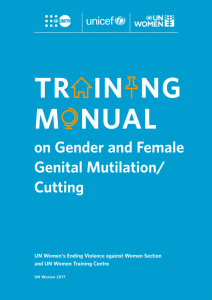 The Training Manual on Gender and Female Genital Mutilation/Cutting (FGM/C), developed by the United Nations Entity for Gender Equality and the Empowerment of Women (UN Women), approaches Female Genital Mutilation/Cutting (FGM/C) from a gender perspective in order to increase participants’ understanding of FGM/C as a harmful practice and a form of violence against women and girls (VAWG).
The Training Manual on Gender and Female Genital Mutilation/Cutting (FGM/C), developed by the United Nations Entity for Gender Equality and the Empowerment of Women (UN Women), approaches Female Genital Mutilation/Cutting (FGM/C) from a gender perspective in order to increase participants’ understanding of FGM/C as a harmful practice and a form of violence against women and girls (VAWG).
During the training, participants reflect on the unequal power relations between men and women as the root cause of FGM/C. They discuss how gender discrimination creates social expectations about women’s bodies and sexuality. They look at the socioeconomic, cultural and institutional factors that maintain the practice of FGM/C. They analyse the role of girls and women, boys and men as change agents for abandonment of the practice as well as sources of resistance and they consider a range of programme approaches that have had varying levels of success.
Each session leads to practical outputs for addressing gender and FGM/C in programming. Participants develop a FGM/C data analysis. They look at ways that FGM/C can be addressed in a similar way to VAWG programming. They discuss how to address harmful beliefs in a culturally sensitive way. They then consider the various aspects
involved in developing a project addressing FGM/C from a gender and human rights perspective, which is intended to complement the Manual on Social Norms and Change (UNFPA-UNICEF, 2016).
Download the manual on the UN Women website.
